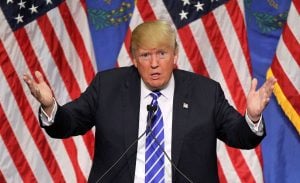[ad_1]

(Photo by Isaac Brekken/Getty)
Last night, Special Counsel Jack Smith docketed his responses to the eleventy-seven motions to dismiss the Florida documents case. His office also noticed the appearance of James Pearce and Cecil VanDevender, the the lawyers who successfully argued against Trump’s presidential immunity claims at the DC Circuit.
Those two things are probably related, as the Special Counsel seems to be squaring up for a trip to the Eleventh Circuit, likely on Trump’s purported immunity claims.
After Trump managed to knock the DC election interference case off the docket by appealing the denial of his motion to dismiss based on presidential immunity claims, his lawyers appear to have gotten the bright idea to run the same play in Florida. Sure, none of the charged conduct in that case took place during Trump’s presidency, but what if he magically transubstantiated the documents into unclassified, personal records — a holy miracle, performed in secret at the White House — signing his own permission slip to defy a subpoena and instruct his henchmen to destroy evidence years later?
That’s exactly what Trump’s lawyers argued in their motions to dismiss the case based on the Presidential Records Act (PRA) and magical, eternal presidential immunity. Although, to be fair they couldn’t quite bring themselves to affirmatively represent to Judge Aileen Cannon that such a rechristening had taken place, instead arguing that the court could simply infer it from Trump’s actions.
This omission did not go unremarked upon by the prosecutors, who noted last night that “the Superseding Indictment nowhere alleges that Trump decided to designate records as ‘personal’ under the PRA, and his dismissal claim is limited only to the allegations charged in the Superseding Indictment, which must be taken as true for purposes of his pretrial dismissal motion.”
The brief went on to argue that, even if Trump had designated the materials as personal and declassified, it would be wholly irrelevant to the obstruction charges, or even to the charge of retaining national defense information under 18 U.S.C. § 793(e)
To prove a violation of that statute, the Government must establish that between the end of his Presidency and, depending on the count, January 17, 2022, June 3, 2022, or August 8, 2022, Trump had unauthorized possession of documents containing national defense information; that he willfully retained those documents; and that he failed to deliver them to a person entitled to receive them. 18 U.S.C. § 793(e). However he designated or did not designate the records, he is not charged with a crime for that act and it provides no basis for an immunity claim. Because Trump cannot identify any official presidential act charged as criminal conduct in the Superseding Indictment, the Court need not reach the merits of his presidential immunity claim.
And in the response to the motion to dismiss under the PRA, Smith’s team pointed out that Trump himself has already admitted that the documents he handed over were not personal records.
Not only did he return 15 boxes of documents to NARA in January 2022, see ECF No. 85 ¶¶ 38-49, refuting any suggestion that he viewed them all as “personal records,” but he also stated at the time that “[t]he National Archives did not ‘find’ anything, they were given, upon request, Presidential Records in an ordinary and routine process to ensure the preservation of my legacy and in accordance with the Presidential Records Act.”
The Special Counsel asked the court to define Trump’s immunity claim as frivolous, “so that he cannot use this meritless argument—disconnected from the actual charges—as the basis for an interlocutory appeal aimed at delaying trial.”
But with all that, the Special Counsel is clearly worried that Judge Cannon is going to buy Trump’s immunity argument and even grant the motion to dismiss. The bulk of the response was devoted to reiterating arguments against immunity made before the DC Circuit, as well as drawing Trump’s theories out to their logical conclusion.
“On Trump’s view, criminal immunity would shield not only a President who sold documents that contained classified information to an adversary while President; but also one who designated classified documents ‘personal,’ took them with him after his Presidency, and then arranged for their sale and delivery after leaving office so long as he initially took the documents while he was President,” they argue.
Finally, the government noted that Trump waited eight months after his indictment to assert this purported immunity, unlike in the election interference case — implicating conduct undertaken when Trump actually was president — where he claimed it almost immediately.
“The record here clearly demonstrates that Trump has raised his immunity claim solely for the purpose of delay, and the Court should reject his effort to divest this Court of jurisdiction in a manner that risks delaying the trial,” they conclude hopefully.
Unfortunately, this case is before Judge Cannon so … lotsa luck.
US v. Trump [SDFL Docket via Court Listener]
Liz Dye lives in Baltimore where she produces the Law and Chaos substack and podcast.
[ad_2]




